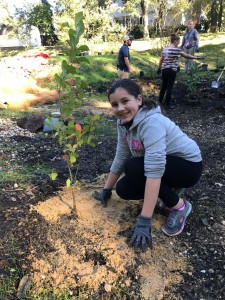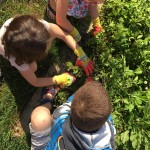Bringing Students Outside the School Walls

A sixth grade student plants a tree to support the stormwater drain system in a local AAC community.
Outdoor education is an important part of every AACPS student’s education. Recognizing the importance of getting students outside of the classroom, the Office of Environmental Literacy and Outdoor Education creates unique opportunities for students to get down and dirty as they explore the world around them. With overnight camps at Arlington Echo, neighborhood plantings at Chesapeake Connections, and nature walks at Camp Woodlands, each experiences asks students to apply what they’ve learned in their core subjects (math, science, etc.) while also expanding what students know about the ecosystem and environmental preservation.
At the backbone of these programs is the dedicated Environmental Literacy and Outdoor Education team. From coordinators to Outdoor Education specialists to the custodians at Arlington Echo, every member of this team uses their passion for the environment to create meaningful experiences for our students. Ted Hall, a member of Arlington Echo’s 4th Grade development team, might capture it best when he says, “We run these [programs] to connect kids to nature. That’s why we do this–not to watch something, but to do something.”
Perhaps most notable about the Environmental Literacy and Outdoor Education team is their commitment to inspiring students at any age to make a different. This is because the heart of the program is not about teaching students facts. Instead, it is about helping students explore their relationship with the environment so they can understand how their actions–and the actions of those around them–can impact the environment. Every outdoor education experience represents a call to action. Whether planting grasses in the Chesapeake Bay to creating recycling programs at their school, students are empowered to become the changemakers our world needs to preserve the environment.
Bringing the Outdoors Into the Curriculum

First grade students learn about the life cycles and habitat of Monarch butterflies.
While the Environmental Literacy and Outdoor Education office is best known for the experiences they provide in the field, their in-school curricular units are equally important at ensuring that students are exposed to environmental literacy at every grade level. Connected to units in science and social studies, students investigate real problems that are threatening the environment in our backyard and learn how they can make a different today so that they can protect tomorrow’s environment. Some of the investigation topics include: What’s the Trouble with Trash? (PreKindergarten), How Cool is Composting? (Grade 3), How are Humans Affecting Global Climate? (Grade 8), and How should governments collaborate to create policies to project ecosystems like the Chesapeake Bay (High School Government).
Want to learn more? Watch our video to go behind the scenes with students and teachers to learn how Outdoor Education experiences are inspiring students to become tomorrow’s environmental changemakers.

Do you have a story about Arlington Echo or Outdoor Education that you want to share? Click here to share your story.

